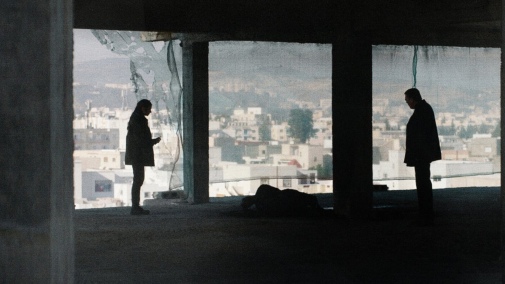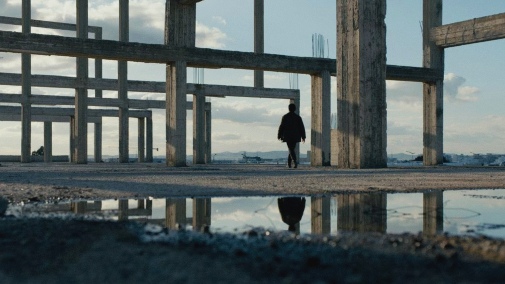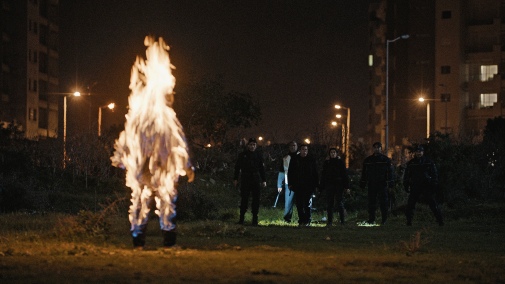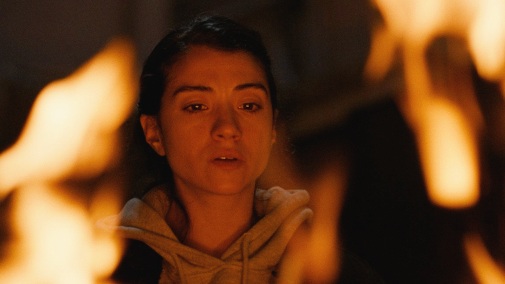Review: "Ashkal" Keeps Its Cards Close to the Chest
 Monday, August 21, 2023 at 3:00PM
Monday, August 21, 2023 at 3:00PM 
Some viewers like their films tidily wrapped up, conclusions tied like neat bows. If there's mystery, it should come with a key to unlock it. Puzzles must be complete by the time credits roll. This is cinema as traditional storytelling, made easy to swallow whole. That kind of work can be made glorious by the right artist, but it would be erroneous to presume it the only valid form of film. Often, it's the rebellious piece that begets the biggest impact, forcing itself into the audience's imagination where it will percolate long after they've left the theater. This is cinema as haunt. This is Ashkal: The Tunisian Investigation, now in limited release…
Les Jardins de Carthage, a construction project in the city of Tunis, set the stage for Youssef Chebbi's third feature. Here the skeleton of a police procedural grows an organism of shadow and flame, fantastic horror lurking beneath the surface. As the camera wanders through the urban landscape, we're made to appreciate the building endeavor frozen in the aftermath of the Arab Spring. The plans that ex-President Zine El Abidine Ben Ali left behind lay abandoned, a reflection of a nation stuck at an impasse. To move into the future, one must confront past crimes, but justice is hard to come by and the system remains flawed even after the fight.
Land of tensions and compromises, the Tunisian capital is seen as a paradigm of transient space and liminal eeriness by Chebbi's camera and DP Hazem Berrabah's keen eye. Compositions juxtaposing human smallness against the backdrop make the buildings look titan-like, cinderblock monsters guarding over an earthly purgatory. It's hard to remain indifferent to such sights, the screen shining with portentous possibilities. Indeed, one feels that, while inaction rules over the slumbering realm, the absence of happenings also means anything can happen – a paradox of lensing and architecture, of disquieting stasis bound to break.

And yet, the unnerving nature of the images also unleashes a degree of dazzlement, the viewer led to appreciate the beauty of the skeletal stage. Moreover, there's a comfort to be found in the deadened concrete when the living peoples squabble, chaos reigns. It all started before the first shot illuminated the cinema's dark room, before the revolution, with decades of police corruption rotting the country's authorities from the inside out. Rooting out this cancer, a special committee emerges, but it's not their doings we follow. Instead, Ashkal concerns itself with Detective Fatma, currently trapped between a rock and a hard place.
Daughter to one of the committee's leaders but bound by police tradition, she wavers between notions of justice bigger than honor and honor over what's right. A storm of doubt rages inside, hidden by a stoic façade that leading lady Fatma Oussaifi embodies, pitch-perfect as she evokes rigidity living hand-to-hand with constant self-questioning. It's she and her saturnine partner, Batal, who we follow into the labyrinthine web of misdeeds and coverups that grows evident with each new body found within Les Jardins. They're all burned to ash, immolated yet unmarked by signs of struggle or even the faintest movement. They stood still while their flesh blazed.

Through charged imagery and direct reference, Chebbi positions these mysterious deaths as an echo of Mohamed Bouazizi's sacrifice, he who set himself aflame and inspired the Tunisian Revolution. The inciting spark of a political movement thus forces a complicated reading into the unexplainable nightmare, recent History screaming into the void, shapeshifting into a tale closer to folklore than the commonplace crime picture. Then again, to imply a nightmarish quality about Ashkal doesn't feel right. There's oneiric value imbued into every shot, intensifying as the narrative unravels at the end. However, serenity, not panic, lies within its shadows, the eye of the firestorm.
Surely, it can't all be a bad dream when the horror feels like conduit to a sense of self-possession beyond the limits of straightforward drama. Neither happiness nor enlightenment are at the end of the tunnel, though a modicum of peace might be. A harmony perchance similar to that of experience by those bodies, so serene as they burned. When fantasy encroaches on reality, discernment fails, but the gut feeling rings true, catharsis manifest within and without as we dive into the fire. The genesis of something new, bigger than us, or just the freedom of obliteration – whatever it is, it pulls us in, a siren song of the screen that'll singe you if you get too close.

Does Ashkal's spectrality entice you, or would you prefer something less mystifying?
 African Cinema,
African Cinema,  Ashkal,
Ashkal,  Horror,
Horror,  Reviews,
Reviews,  Youssef Chebbi,
Youssef Chebbi,  foreign films
foreign films 

